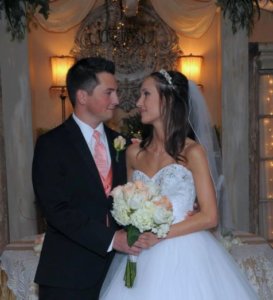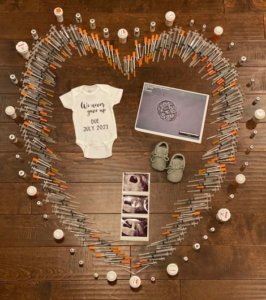History of tubal disease derails couple’s family building plans

When Brooke and Kerry married six years ago, they had no idea it would take them this long to start their family. But, a history of tubal disease for Brooke proved getting pregnant wasn’t going to be so easy.
Their fertility journey began the day the Gonzales couple said their vows in April of 2015. Brooke and Kerry knew they wanted to start a family right away. But, it wasn’t long into their marriage when they suspected that becoming parents would not be an easy journey.
Brooke knew something was wrong with her because of the aching, constant pain in her lower abdomen. “The six years that we spent trying to conceive was tough on us. Many of these days included hope and optimism, but most of them included tears, frustration, heartache and physical pain for myself.”
Abdominal pain leads to surgery and loss of fallopian tube
After enduring many years of abdominal pain, Brooke was finally introduced to Dr. Wendy Holden-Parker, a Baton Rouge obstetrician. “At that point, I had finally met a doctor who took my pain seriously,” says Brooke. After doing an ultrasound, Dr. Holden-Parker was able to see that Brooke had a hydrosalpinx in her right tube.
A hydrosalpinx is a form of tubal disease in which the fallopian tube is blocked with a cyst containing a watery fluid. This condition is typically caused by scar tissue from a previous infection, endometriosis or a previous surgery. Surgical removal of the fallopian tube is the most common treatment for hydrosalpinx and a history of tubal disease. Infertility is a common result.
During Brooke’s procedure, Dr. Holden-Parker removed her right fallopian tube and repaired the left tube which had a hydrosalpinx cyst as well. Because the fallopian tubes are essential to successful conception, getting pregnant with just one tube can be hard. With the remaining tube also scarred by the hydrosalpinx would make it even more difficult. In vitro fertilization, IVF, is often required to aid in conception for women with tubal disease.
“Waking up that day and learning that I had one of my tubes removed was the hardest day of my life,” recalls Brooke. “At that point we felt so defeated.”
IVF is often the only option to get pregnant with tubal disease
After continuing to try naturally to get pregnant for two years after Brooke’s surgery, the couple finally came to terms with what the doctors had told them all along – with their history of tubal disease they would need IVF to start their family.
In January of 2020 they decided to move forward and begin IVF with Dr. John Storment at Fertility Answers. Originally scheduled to begin their first ovarian stimulation injections on March 13, 2020, their plans were put on hold as clinics were required to shut down all unnecessary procedures due to the pandemic. As soon as Fertility Answers was able to safely open their doors again, Brooke and Kerry eagerly resumed treatment.
A successful egg retrieval yielded an abundance of eggs and the couple was ultimately able to freeze sixteen embryos. Finally some good news! But their first frozen embryo transfer ended with a negative pregnancy test. Saddened by this news but still hopeful, Brooke and Kerry decided to move forward with a second transfer right away.
“It was a hard time for me as I was sad and cynical and had lost hope in my body,” recalls Brooke. During the two week wait she tried hard not to get excited. “I had to put it in God’s hands,” she said. The night before their Beta test they decided to take a home pregnancy test. Brooke and Kerry both looked together and couldn’t believe their eyes. Two pink lines! They were finally pregnant! The nine months of fertility treatments had paid off.
“We knew that we would do whatever it took to become parents.”

The couple credits Dr. Storment and his staff for getting them through their journey. “They were always there when we needed them, had questions, or simply needed reassurance. They became like family to us. Their excitement when we learned the good news is something that I will cherish forever,” recalls Brooke.
Brooke has some advice for others going through their own infertility journeys. “Be mad, be sad, be angry as you have the right to feel all of those things. But never give up hope. Trust the doctors and trust the process. Your baby blessing will come soon. Our lives are forever changed because of Fertility Answers. We wouldn’t trust anyone else with our journey. We cannot wait to welcome our little boy into the world.”
Brooke and Kerry are expecting their baby boy in July 2021.


